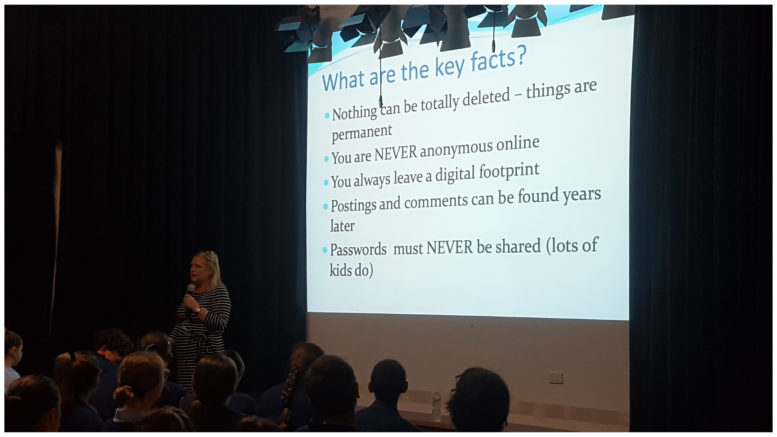On Friday, 14th June, the Secondary School was fortunate enough to have leading Australian cyber safety expert, Susan McLean speaks to the students in Years 8, 9 and 10. Susan has over twenty-one years’ experience in dealing with online issues across all online platforms. She not only has a unique understanding of the school environment but also a comprehensive understanding of all current laws (criminal and civil) and a school’s duty of care to its students as it applies to online issues. At South Coast Baptist College, we have a 24/7 student accountability for inappropriate use of social media.
Susan’s session with the students was delivered with clarity and humour, and her talk challenged all students to stop and think about what they do online and what the consequences might be for them not only today but for the rest of their lives. Susan’s theme for the session was ‘Respect and Responsibility’ and she left all students with no doubts about what they needed to do to stay safe online. Below is a brief outline of the major points Susan covered in her talk:
- The Facts – What you need to know about cyberspace in order to make good online decisions. Fact V Fiction.
- Digital Reputation – What you do online now and what you post will have an impact on your future opportunities. What do people look for, and how to make your digital reputation as positive as possible. This included the impact that the name a student gives for their private email address can affect their employability.
- Cyberbullying – What is cyberbullying and how/when does it happen? How does it make a victim feel and what students can do if they see it happen or if it is happening to them? Did you know that cyberbullying is a crime and the Police can be involved?
- Online ‘friends’ that are not really a friend. How strangers find us online and what they might ask us to do. Susan talked about online child sexual predators, where they hang out and how to avoid becoming a victim. What is online grooming and who is at risk?
- Sexts – Sending, receiving & possessing naked or sexually explicit images. What are the real consequences for under 18’s, pressure to conform and legal considerations?
- What are the sites and apps that students are using and what are the age requirements for each site? How wrong info about some apps is leading to poor decisions
- Staying safe online – How students can be as safe as possible online. How to set up a safe social networking site.
The biggest take-aways from Susan’s session with the students, which are the things that parents should also be aware of were:
- Nothing can be totally deleted – things are permanent
- You are NEVER anonymous online
- You always leave a digital footprint
- Postings and comments can be found years later
- Passwords must NEVER be shared but lots of kids do
A useful website for parents to visit to get more information on how to keep their child safe online is listed below.
https://www.esafety.gov.au/parents
Shelagh Scott
Deputy Head Secondary – Wellbeing
